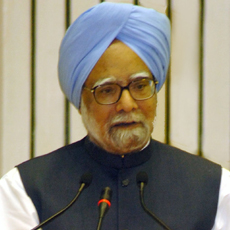India's first indigenous nuclear submarine launched
 New Delhi - India's first indigenously designed and built nuclear-powered attack submarine, INS Arihant, was launched at the southern port of Vishakhapatnam Sunday in the presence of Prime Minister Manmohan Singh and top navy officials.
New Delhi - India's first indigenously designed and built nuclear-powered attack submarine, INS Arihant, was launched at the southern port of Vishakhapatnam Sunday in the presence of Prime Minister Manmohan Singh and top navy officials.
The INS Arihant is scheduled to be commissioned in the Indian Navy after extensive deep sea and weapons trials, IANS and PTI news agencies reported.
The Arihant, which translates as destroyer of enemies, is part of India's Advanced Technology Vessel programme. It is the first of three similar vessels which are to be built and marks a quantum leap in India's shipbuilding capabilities.
The submarine was launched for sea trials at the Matsya naval dockyard in Vishakhapatnam.
Singh's wife Gursharan Kaur broke a coconut and performed a religious ceremony, after which she unveiled a plaque naming the 112-metre-long submarine.
Defence Minister AK Antony and Indian Navy chief Admiral Sureesh Mehta were present at the function.
A 6,000-ton submarine powered by a 85-megawatt nuclear reactor, the Arihant can acquire surface speeds of 22 to 28 kilometres per hour and submerged speed of up to
44 kilometres per hour.
It carries a crew of up to 95 and is armed with 12 K-15 ballistic missiles, each capable of carrying a 500-kilogram nuclear warhead to a target 750-kilometres away.
The 300-billion-rupees (6.24-billion-dollars) secret nuclear submarine project was started in the 1980s. The first official admission that the project was nearing completion was made by Antony in February.
The nuclear submarine is a key component of India's strategic deterrence programme. India has declared a "no first use" of nuclear weapons and its systems need to survive a first strike for retaliation.
India now has the capacity to launch nuclear weapons from land, air and sea.
India had achieved a historic milestone in the country's defence preparedness, Singh said at the launch.
"Today we join a select group of five nations who possess the capability to build a nuclear powered submarine," he said.
United States, Russia, France, Britain and China have nuclear submarines.
The sea was becoming increasingly relevant in the context of India's security interests, Singh said. "We must re-adjust our military preparedness to this changing environment. Our Navy has a huge responsibility in this regard."
"We do not have any aggressive designs nor do we seek to threaten anyone," the prime minister said, adding that India had to take all necessary measures to safeguard the country and keep pace with technological advancements worldwide.
The Indian Navy is also scheduled to get a Russian-made Akula-class nuclear attack submarine from Russia by year-end.
Before attending the ceremony at Vishakhapatnam Singh and Anthony layed wreaths at the memorial to the unknown soldier in New Delhi to commemorate the Indian Army's success in pushing out Pakistan-backed intruders who occupied Kargil area in Jammu and Kashmir state in 1999.
July 26 is marked every year as Kargil Victory Day. The face-off in Kargil in the summer of 1999 brought India and Pakistan to the brink of their fourth full-scale war.
An estimated 530 Indian soldiers were killed in two months of fighting before the intruders were pushed back across the international border. (dpa)